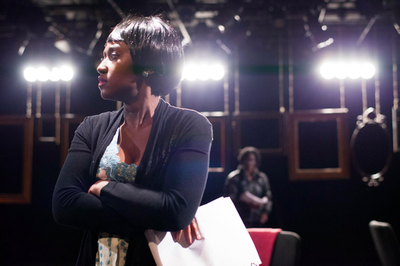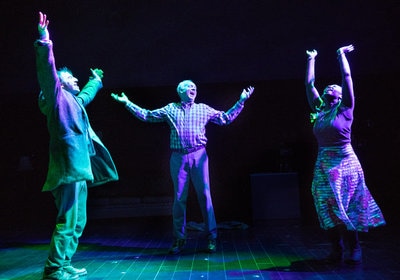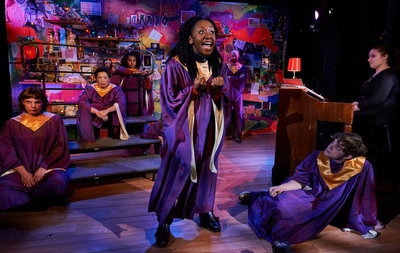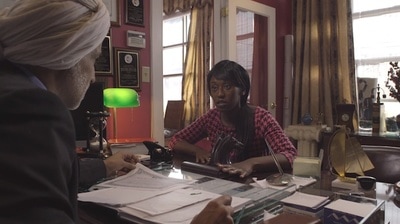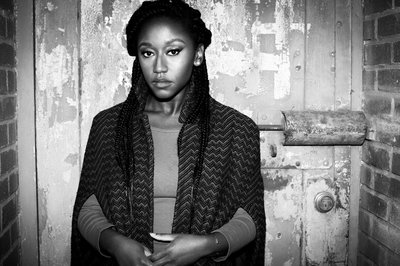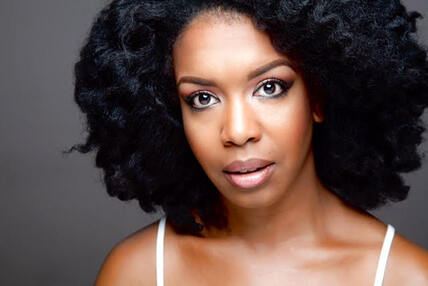
Hometown/Where did you grow up?Born in wash dc, grew up in riverdale md.
Current town?
I call NY home.
Describe your career in 25 words or fewer. I have always been a scrappy dog fighting my way through my career – not meaning struggle, but I’ve been hustling. A wonderful journey, but I’d describe it as a big old ocean, where I’m having a good time swimming, and every now and then I find land, or get airlifted by an airplane, and every now and then I sink a little…
When did you first know you wanted to be an actress?
Oh, I was always putting on little plays and writing when I was a child. It wasn’t until high school, though, with the strong encouragement of my drama teacher, Brian Kosanovich, that I decided to make a go of it as a career. Brian was also the first out gay man I’d ever met -- and me being a black female and the child of immigrants at a predominantly white boarding school, we were both kind of outsiders and we latched onto each other. We continue to be friends today. He kind of groomed me till I was playing leads by the end of school.
It started my freshman year, I had this one friend, both of us new to the school, and we went to audition for the school play, “Runaways” by Liz Swados, god rest her soul. I got in and got a pretty substantial role, especially considering I was a freshman -- I played ‘Robi.’ That was the start.
Why is acting important?
Frankly? In and of itself, I don’t think it is. Storymaking, on the other hand, is hugely important and a reason to live. I believe that identifying the humanity in others and in ourselves through story is integral to the experience of being alive. But acting is just one cog in the vast, glorious story-making machine.
What was your training (if any)?
I went to undergrad at Penn and the theater department there wasn’t geared towards performance, so I didn’t study acting, focusing instead on French literature and sociology.
And right after that when I arrived in New York, I did The Actors Center program under J. Michael Miller and trained with Scott Freeman, Grace Zandarski, Orlando Pabotoy, Jane Nichols, Charles Tuthill, Felix Ivanov and others. To be honest, it remains the most important education I’ve received thus far (though I’m wary of superlatives at this point because I’m sure life has more to teach me). I also did the Shakespeare Lab at the Public Theater, back when it was available to early career actors (it now focuses on mid-career actors).
Do you have/have you had a support job? Are you supported in other ways?
I do not currently have a support job. My fiancé [novelist Karim Dimechkie] and I are extremely fortunate to have made some money off our art and are coasting, working furiously on more art-making until the next monetizable gig. The hustle continues. I have had plenty of day-jobs though-- I worked the door at a restaurant/night club, I checked coats, I worked in arts administration, I worked retail, I babysat. You name it, I’ve done it. And I will forever appreciate those jobs because they really gave me a needed (albeit painful) dose of humility.
How do you approach auditions? (Both the art-work and the game of it.)
I’m incredibly nervous about auditioning, so oftentimes I’ll invest in renting studio space nearby, to move around, warm up and rehearse in right beforehand (like right before -- I’ll walk out of the rehearsal space and go straight to the audition). I’ve found that it really gets my “eye of the tiger” mentality together and allows me to focus. Plus it simulates the physical conditions under which I’ll be auditioning, so when I get in the room, I’m not so thrown.
How do you deal with rejection?
Ah ha -- I’m still figuring it out! I used to reach right for the chocolate covered almonds, but I realized quickly that I felt even worse afterward. I’ve become a huge believer in self-care: exercise, massage, baths, meditation, a $1 oyster happy hour, etc., so now I usually up my self-care regimen post-rejection and make sure I do things that will make me feel good. And a good cry is always allowed.
What is your superpower? (e.g., especially good at dialects, crying easily, singing, being funny, clown, playing the trombone? Directing? Writing?)
I am in the throes of completing Queen of Glory -- my first feature that I wrote, directed and star in -- and I vacillate between thinking I’m a genius and thinking I’m an idiot, so on any given day my belief in my gifts vary.
Today, I think writing is my superpower. I was very lucky to attend a high school [The Loomis Chaffee School] that greatly emphasized the importance of the written word, so it was only when I got into the real world (or on Twitter) that I was like, “Huh, most people are crappy writers,” and then I feel pretty great about my gift.
Where did you learn to write? How did you nurture that ability, and who spurred you on?
I took a class through Gotham Writers Workshop about writing for half-hour comedy, which was good for learning script-writing format. And then a lot of scripts, remarkably, are available online, and reading other people’s scripts while simultaneously watching the same movie was really informative -- I did some of that to learn structure, what makes it into the final movie version -- it’s interesting. I wrote my very first script (not yet made into a film) with a wonderful writer who was in the MFA dramatic writing program at NYU at the time, and in co-writing with her, I benefitted from her education.
I also did the LAByrinth Theater Company Master Class with Brett Leonard and made some lifelong friends through that program. That was the first time I’d written anything, and they were very encouraging -- I got to hear someone say words that I had written, out loud. It was a one-act, and in it there was a line that I didn’t think was that funny, I was just putting stuff on the page. But then when it was read out loud, people cracked up laughing at this part, and I got that little blush of, “Oh, people think I’m funny!” So that was the starting point.
Advice or inspiration?
I’ve definitely given this one in an interview before, but I love “There’s good, there’s cheap, and there’s fast. Pick 2.” It applies specifically to filmmaking, surely, but really to everything else, right?
Plugs!
I love Instagram, so you can keep up with me @officialnanamensah and/or via my website at nanamensah.com. Also check out queenofglory.com!
How does being an actress have an impact on your relationships? (Friends, family, relationships, lack thereof …).
I think maintaining friendships outside of your creative industry is difficult, but those relationships are important because they keep you grounded! Mainly, it’s tough because of money -- having a wildly variant income is stressful in many ways that other people outside of the business don’t understand. When a non-artist friend invites me to dinner at a super nice restaurant, or on an exotic vacation, my response is usually no, because even if I can afford it in the short term, there’s no guarantee that I won’t regret that expenditure 6 months from now. I hope there’s a day coming where I don’t have to think like that.
Then again, maybe it has nothing to do with the industry and that’s just my personality.
Current town?
I call NY home.
Describe your career in 25 words or fewer. I have always been a scrappy dog fighting my way through my career – not meaning struggle, but I’ve been hustling. A wonderful journey, but I’d describe it as a big old ocean, where I’m having a good time swimming, and every now and then I find land, or get airlifted by an airplane, and every now and then I sink a little…
When did you first know you wanted to be an actress?
Oh, I was always putting on little plays and writing when I was a child. It wasn’t until high school, though, with the strong encouragement of my drama teacher, Brian Kosanovich, that I decided to make a go of it as a career. Brian was also the first out gay man I’d ever met -- and me being a black female and the child of immigrants at a predominantly white boarding school, we were both kind of outsiders and we latched onto each other. We continue to be friends today. He kind of groomed me till I was playing leads by the end of school.
It started my freshman year, I had this one friend, both of us new to the school, and we went to audition for the school play, “Runaways” by Liz Swados, god rest her soul. I got in and got a pretty substantial role, especially considering I was a freshman -- I played ‘Robi.’ That was the start.
Why is acting important?
Frankly? In and of itself, I don’t think it is. Storymaking, on the other hand, is hugely important and a reason to live. I believe that identifying the humanity in others and in ourselves through story is integral to the experience of being alive. But acting is just one cog in the vast, glorious story-making machine.
What was your training (if any)?
I went to undergrad at Penn and the theater department there wasn’t geared towards performance, so I didn’t study acting, focusing instead on French literature and sociology.
And right after that when I arrived in New York, I did The Actors Center program under J. Michael Miller and trained with Scott Freeman, Grace Zandarski, Orlando Pabotoy, Jane Nichols, Charles Tuthill, Felix Ivanov and others. To be honest, it remains the most important education I’ve received thus far (though I’m wary of superlatives at this point because I’m sure life has more to teach me). I also did the Shakespeare Lab at the Public Theater, back when it was available to early career actors (it now focuses on mid-career actors).
Do you have/have you had a support job? Are you supported in other ways?
I do not currently have a support job. My fiancé [novelist Karim Dimechkie] and I are extremely fortunate to have made some money off our art and are coasting, working furiously on more art-making until the next monetizable gig. The hustle continues. I have had plenty of day-jobs though-- I worked the door at a restaurant/night club, I checked coats, I worked in arts administration, I worked retail, I babysat. You name it, I’ve done it. And I will forever appreciate those jobs because they really gave me a needed (albeit painful) dose of humility.
How do you approach auditions? (Both the art-work and the game of it.)
I’m incredibly nervous about auditioning, so oftentimes I’ll invest in renting studio space nearby, to move around, warm up and rehearse in right beforehand (like right before -- I’ll walk out of the rehearsal space and go straight to the audition). I’ve found that it really gets my “eye of the tiger” mentality together and allows me to focus. Plus it simulates the physical conditions under which I’ll be auditioning, so when I get in the room, I’m not so thrown.
How do you deal with rejection?
Ah ha -- I’m still figuring it out! I used to reach right for the chocolate covered almonds, but I realized quickly that I felt even worse afterward. I’ve become a huge believer in self-care: exercise, massage, baths, meditation, a $1 oyster happy hour, etc., so now I usually up my self-care regimen post-rejection and make sure I do things that will make me feel good. And a good cry is always allowed.
What is your superpower? (e.g., especially good at dialects, crying easily, singing, being funny, clown, playing the trombone? Directing? Writing?)
I am in the throes of completing Queen of Glory -- my first feature that I wrote, directed and star in -- and I vacillate between thinking I’m a genius and thinking I’m an idiot, so on any given day my belief in my gifts vary.
Today, I think writing is my superpower. I was very lucky to attend a high school [The Loomis Chaffee School] that greatly emphasized the importance of the written word, so it was only when I got into the real world (or on Twitter) that I was like, “Huh, most people are crappy writers,” and then I feel pretty great about my gift.
Where did you learn to write? How did you nurture that ability, and who spurred you on?
I took a class through Gotham Writers Workshop about writing for half-hour comedy, which was good for learning script-writing format. And then a lot of scripts, remarkably, are available online, and reading other people’s scripts while simultaneously watching the same movie was really informative -- I did some of that to learn structure, what makes it into the final movie version -- it’s interesting. I wrote my very first script (not yet made into a film) with a wonderful writer who was in the MFA dramatic writing program at NYU at the time, and in co-writing with her, I benefitted from her education.
I also did the LAByrinth Theater Company Master Class with Brett Leonard and made some lifelong friends through that program. That was the first time I’d written anything, and they were very encouraging -- I got to hear someone say words that I had written, out loud. It was a one-act, and in it there was a line that I didn’t think was that funny, I was just putting stuff on the page. But then when it was read out loud, people cracked up laughing at this part, and I got that little blush of, “Oh, people think I’m funny!” So that was the starting point.
Advice or inspiration?
I’ve definitely given this one in an interview before, but I love “There’s good, there’s cheap, and there’s fast. Pick 2.” It applies specifically to filmmaking, surely, but really to everything else, right?
Plugs!
I love Instagram, so you can keep up with me @officialnanamensah and/or via my website at nanamensah.com. Also check out queenofglory.com!
How does being an actress have an impact on your relationships? (Friends, family, relationships, lack thereof …).
I think maintaining friendships outside of your creative industry is difficult, but those relationships are important because they keep you grounded! Mainly, it’s tough because of money -- having a wildly variant income is stressful in many ways that other people outside of the business don’t understand. When a non-artist friend invites me to dinner at a super nice restaurant, or on an exotic vacation, my response is usually no, because even if I can afford it in the short term, there’s no guarantee that I won’t regret that expenditure 6 months from now. I hope there’s a day coming where I don’t have to think like that.
Then again, maybe it has nothing to do with the industry and that’s just my personality.
This interview was conducted by Kyra Miller.
